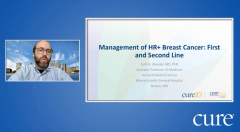
Educated Patient® Metastatic Breast Cancer Summit Management of Triple Negative Disease Presentation: November 12, 2022
Watch Dr. Neelima Vidula, from Massachusetts General Hospital, discuss the management of triple-negative disease during the CURE Educated Patient Metastatic Breast Cancer Summit.
Triple-negative breast cancer (TNBC) is an aggressive disease that does not express estrogen (ER), progesterone (PR) or HER2 receptors. While TNBC often recurs or metastasizes, there are more drugs than ever — as well as ongoing clinical trials — for this patient population, explained Dr. Neelima Vidula.
“Triple-negative breast cancer remains a disease subtype that is difficult to control and one that often develops chemotherapy resistance,” Vidula, an assistant professor of Medicine at Harvard Medical School and attending physician in medical oncology as Massachusetts General Hospital in Boston, said at CURE®’s Educated Patient® Metastatic Breast Cancer Summit. “The identification of novel targets has led to the development of new therapies that may help improve outcomes.”
Immunotherapy ‘Revs Up an Immune Response’
In November 2020, the Food and Drug Administration
In the clinical trial that led to the drug’s approval, the average progression-free survival (time from treatment until disease progression) was 9.7 months for patients given the Keytruda-containing regimen, compared to 5.6 months for those who received chemotherapy alone. Overall survival (time from treatment until death of any cause) was also superior with the immunotherapy-containing regimen, at an average of 23 months, compared to 16 months in the chemotherapy group.
However, when receiving immunotherapy agents, it is important that patients watch out for side effects, according to Vidula.
“In about 10% of patients who receive immunotherapy, there is a possibility of developing an autoimmune event,” she explained. “Often these are thyroid issues, either having an overactive thyroid or a low thyroid; inflammation of the pituitary gland; inflammation of the liver; developing a condition called adrenal insufficiency, where patients may require steroids; diarrhea; sometimes some skin rashes; and sometimes inflammation of the lungs. So these are important toxicities to be mindful of,” she said.
Antibody Drug Conjugates Target Chemotherapy to Cancer Cells
Another method of treating metastatic TNBC is the use of antibody drug conjugates, a type of drug that selectively delivers chemotherapy to cancer cells — sparing more of the healthy cells from being damaged by chemotherapy, and thus decreasing the frequency and intensity of chemotherapy-related side effects.
In April 2021, the
Side effects for Trodelvy include low blood cell counts, nausea, diarrhea and fatigue, though Vidula mentioned, “In my experience with this agent, these are toxicities that we can manage fairly easily. Sometimes it'll require maybe doing a dose interruption or a dose reduction or giving some growth factor to sustain a patient's white blood cell counts and also giving medications to help with nausea and medications to help with diarrhea such as Imodium.”
More recently, the FDA approved another antibody drug conjugate,
“Some patients may have a low amount of HER2 expression; they may still have traditionally been characterized as having triple-negative breast cancer. But within that subset, some of these patients may have a HER2 status with an immunohistochemical result of 1 or 2 with a negative confirmatory FISH test (which measures the amount of HER2), something that classically would have been referred and defined as HER2 negative, but now we can reclassify as HER2 low,” Vidula said.
With Enhertu, patients should be weary of interstitial lung disease (lung inflammation) that, according to studies, occurs in about 10% to 12% of patients on the drug. Recent guidelines recommend frequent lung scans to monitor for this serious side effect, Vidula said.
PARP Inhibitors Are ‘Exciting’
Recent years have also brought the FDA approval of two PARP inhibitors:
PARP inhibitors work by targeting DNA damage repair pathways to prevent them from working in cells with BRCA mutations. In doing so, cancer cells are unable to survive.
“One of the really appealing factors of PARP inhibitors is that their oral targeted therapies, and the side effects of these agents, often include lower blood counts or (gastrointestinal) issues, but they're generally fewer side effects than one would see with chemotherapy. So, they're an exciting class of drugs,” Vidula said.
However, she did mention that only approximately 5% to 10% of patients with TNBC have a BRCA mutation, so current trials are exploring how these agents can be expanded to a larger TNBC population.
Overall, Vidula said that it is an exciting time for TNBC, with more advancements to come.
“Although advanced triple-negative breast cancer remains incurable and the mainstay of treatment is still chemotherapy, in recent years, we have seen a number of advances in this field that have generated new targeted therapies that are beneficial for patients,” she concluded.
For more news on cancer updates, research and education, don’t forget to













